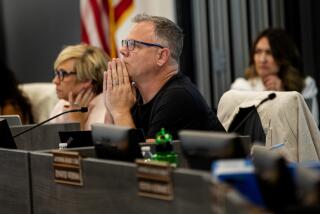Charter Oak Recall More a Test of Style Than Issues
- Share via
The manner in which two school board members backed a widely criticized school district reorganization that affected three schools seems to have replaced the plan itself as the issue in Tuesday’s recall election in the Charter Oak Unified School District.
When 4,000 people signed recall petitions after the plan was enacted, the election to recall board President Carol Cherry and board member Ann Hall was expected to be a demonstration against the reorganization. However, some school officials, candidates and leaders of the recall effort say there is more acceptance of the plan now, but there is still concern about the manner in which the two board members supported it.
“We’re not even talking about an issue,” said William R. Clark, the recall leader. The central concern is the two board members’ attitudes while the plan was being considered.
Hall and Cherry, called “uncommunicative and insensitive” by their critics, defended the plan and the way they handled themselves in supporting it.
“We had six public hearings,” Cherry said. “We heard what they had to say, and we were responsive.”
‘Questions Were Answered’
Hall said, “These people had any amount of time available to them” to discuss the reorganization. “Their questions were answered. Nobody silenced them.”
Clark said the reorganization, which closed two intermediate schools and turned one of the district’s two high schools into an intermediate school, has now been accepted by many opponents.
John Rose, who was elected to the board in November after the plan had been adopted, said that it “was a very hot item in the district last year.” But many issues have been settled and “given the community some confidence in the school board,” added Rose, who did not take a stand on the recall election. “I think the community is reacting with satisfaction.”
The Charter Oak district covers parts of Covina and Glendora and a small portion of San Dimas.
Opposing sides in the election claim that a high voter turnout will work in their favor. But the special election is not expected to arouse much interest in the district, where an average of 1,500 voters--out of 16,000 who are registered--have turned out recently in regularly scheduled elections.
The ballot lists four items. Voters are asked to decide if Hall should be recalled. If she is, voters can choose from among three candidates to replace her. The third item asks if Cherry should be recalled. One candidate is listed to replace her. Polls will be open from 7 a.m. to 8 p.m.
Cherry, who has been on the board for eight years, faces Joseph Molloy, chief of police and head of public safety in Alhambra, who said he favors recalling the two board members, but is not a member of the recall committee and is not campaigning for office.
“There are not a lot of heavyweight issues,” Molloy said. “It was the attitude, the poor way they dealt with things.”
Hall, halfway into her second four-year term on the board, is being challenged by Robert (Bob) Hoenig, a part-time teacher and printer; Kathleen M. Rivet, mother of six children who is listed on the ballot as a professional parent, and Julius R. Marini, a physician.
Hoenig said he is opposed to recalls, but feels qualified for the board if Hall is removed from office. Rivet said she is not actively campaigning and is mainly contacting her friends.
Marini, who for many years has been the physician and medical consultant for the district, said, “The problem was not what was done, but how it was done. You can tell how upset we were because almost three times as many people signed recall petitions as turn out to vote.”
The district is made up mostly of middle-class residents and at its peak 15 years ago had 9,500 students in 13 schools.
In 1985, with enrollment down to 5,400 and with several elementary schools closed, the school board changed one of its two high schools, Royal Oak, into an intermediate school and closed two intermediate schools. The district now has five elementary schools, one intermediate school and one high school.
The reorganization called for extensive busing of students, increasing some class sizes and sending some students at Charter Oak High School to classrooms across the street in an elementary school that was adapted for high school classes.
The plan drew hundreds of citizens to often stormy school board meetings. It was put into effect in September and continues to draw some criticism from parents who complain of long bus rides by their children.
Michael Castin, who became superintendent last year when Ron Everhart resigned after implementing the reorganization, said portable classrooms will soon be added to Charter Oak High School so that students no longer will have to cross the street to attend classes.
More to Read
Sign up for Essential California
The most important California stories and recommendations in your inbox every morning.
You may occasionally receive promotional content from the Los Angeles Times.












